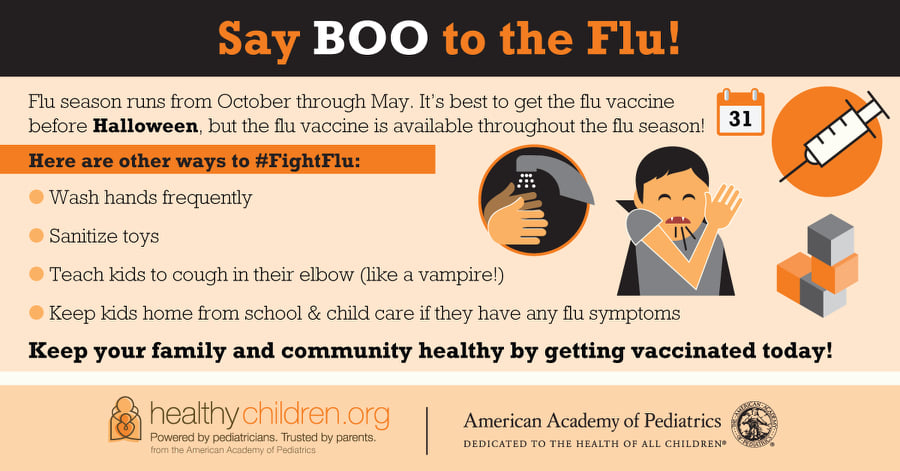
Flu season is here, which means Flu SHOT season is also here. Getting a flu vaccine this fall will be more important than ever, not only to reduce your risk from flu but also to help conserve potentially scarce health care resources in the wake of the COVID-19 pandemic.
What are the benefits of the flu vaccination?
Receiving the flu vaccines reduces flu illnesses, sick appointments, hospital stays, and missed time from work or school. It can also be lifesaving for high risk patients like children, seniors, and pregnant women.
Can the flu vaccine give me the flu?
The viruses in the flu shot are killed (inactivated), so you cannot get the flu from a flu shot. However, you may experience some minor side effects like, soreness, redness or swelling at the shot site, a low-grade fever, and some aches.
For those that receive the nasal spray, the viruses are weakened and do not cause severe symptoms often associated with influenza illness. Side effects from the nasal spray may include, runny nose, sore throat, cough, wheezing, headache, vomiting, muscle aches, or fever.
Who should get vaccinated this season?
Everyone six months of age and older should receive a flu vaccine at the beginning of the flu season, typically every fall.
Who should not be vaccinated against seasonal flu?
A patients age, health or allergies may determine they should not receive the flu vaccine. Talk with your physician to ensure you or your children should receive the flu vaccine.
Should a flu vaccine be given to someone with a suspected or confirmed case of COVID-19?
No. Vaccination should be deferred (postponed) for people with suspected or confirmed COVID-19, regardless of whether they have symptoms, until they have met the criteria to discontinue their isolation. While mild illness is not a contraindication to flu vaccination, vaccination visits for these people should be postponed to avoid exposing healthcare personnel and other patients to the virus that causes COVID-19. When scheduling or confirming appointments for vaccination, patients should be instructed to notify the provider’s office or clinic in advance if they currently have or develop any symptoms of COVID-19.
Additionally, a prior infection with suspected or confirmed COVID-19 or flu does not protect someone from future flu infections. The best way to prevent seasonal flu is to get vaccinated every year.
Why should I get my child vaccinated?
The flu is dangerous for all people, but children under five years old are at an especially high risk when they get sick with the seasonal flu. The flu vaccine is your children’s best defense against contracting and spreading the flu.
When should I get a flu vaccine?
For people receiving one dose of the flu vaccine, the Centers for Disease Control recommends that people get the flu vaccine by the end of October. If your child requires two doses, they will need to be given four weeks apart, so chat with your pediatrician on the best time to give the first dose. Getting the vaccine in the summer months may result in reduced protection later in the flu season, especially for high risk patients. There are benefits to receiving the flu vaccine later in the season, so it’s never too late to be vaccinated!
How effective is the flu vaccine?
The patient’s age and health status will determine the effectiveness of the flu vaccine, as well as how well the flu in the vaccine matches the flu circulating in your community. The CDC estimates that the flu vaccine reduces the risk of flu illness by between 40% and 60% among the overall population, when the seasonal flu circulating is well-matched with the flu vaccine.
Besides vaccination, how can people protect themselves against the flu?
Getting the flu vaccine every year is your best defense against the flu. People should also take preventive actions every day. These include, frequently washing hands, covering coughs using the inside of your elbow, not your hand, and avoid having contact with people who are sick (even if they haven’t been diagnosed with the flu).
Where can I get the flu vaccine?
This year’s flu shot is available at IHA Primary Care and Ob/Gyn practices and pediatric doses are available at IHA Pediatric practices. Adults and children may receive the flu shot at any IHA Urgent Care location. Click below to schedule your flu shot.
Can the flu vaccine prevent COVID-19?
No, the flu vaccine cannot prevent you from becoming infected with COVID-19. You and your family should continue practice CDC recommendations to minimize your risk of contracting COVID-19, including, wearing masks outside of your home, social distancing and frequent hand washing.
What is the difference between Influenza and COVID-19?
Influenza (Flu) and COVID-19 are both contagious respiratory illnesses, but they are caused by different viruses. COVID-19 is caused by infection with a new coronavirus (called SARS-CoV-2) and flu is caused by infection with influenza viruses. Because some of the symptoms of flu and COVID-19 are similar, it may be hard to tell the difference between them based on symptoms alone, and testing may be needed to help confirm a diagnosis. Flu and COVID-19 share many characteristics, but there are some key differences between the two.
There are some key differences between flu and COVID-19. COVID-19 seems to spread more easily than flu and causes more serious illnesses in some people. It can also take longer before people show symptoms and people can be contagious for longer. Another important difference is there is a vaccine to protect against flu. There is currently no vaccine to prevent COVID-19. The best way to prevent infection is to avoid being exposed to the virus.
Can getting the flu shot increase your risk of getting COVID-19?
Currently, there is no evidence that getting the flu vaccine can increase your risk of getting COVID-19.
Is it safe to go out to get the flu shot during the COVID-19 pandemic?
Yes. Getting a flu vaccine is an essential part of protecting your health and your family’s health this season. To protect your health when getting a flu vaccine, follow CDC’s recommendations for running essential errands and doctor visits, like wearing a mask outside of your home, social distancing and frequent hand washing. Continue to take everyday preventive actions.
What is IHA doing to ensure it’s safe for me and my family to come into the office for a flu vaccine?
Patient safety is, now more than ever, our top priority. We’re taking several precautions to minimize your risk of exposure to COVID-19 while visiting an IHA practice in person, including:
- requiring all patients, guests, staff, and providers to wear masks in our practices
- providers and staff wear personal protective equipment
- taking the temperature of all patients, providers, and staff upon entry into our practices
- limiting the number of people in our practices, which means you may be asked to wait in your car instead of our waiting room
- spacing the timing of patient appointments
- maintaining an acceptable (greater than 6 foot) distance between patients in all common areas
- following the cleaning protocols laid out by the Centers for Disease Control (CDC) to ensure safe, sanitized environments
- in pediatric practices, we’re scheduling sick and well patients at different times of the day
Scheduling your flu shot is easy! The flu shot is available at IHA and St. Joe’s Medical Group primary care and OBGYN practices, as well as, urgent care locations. Click below to find a time and location that work for you.


